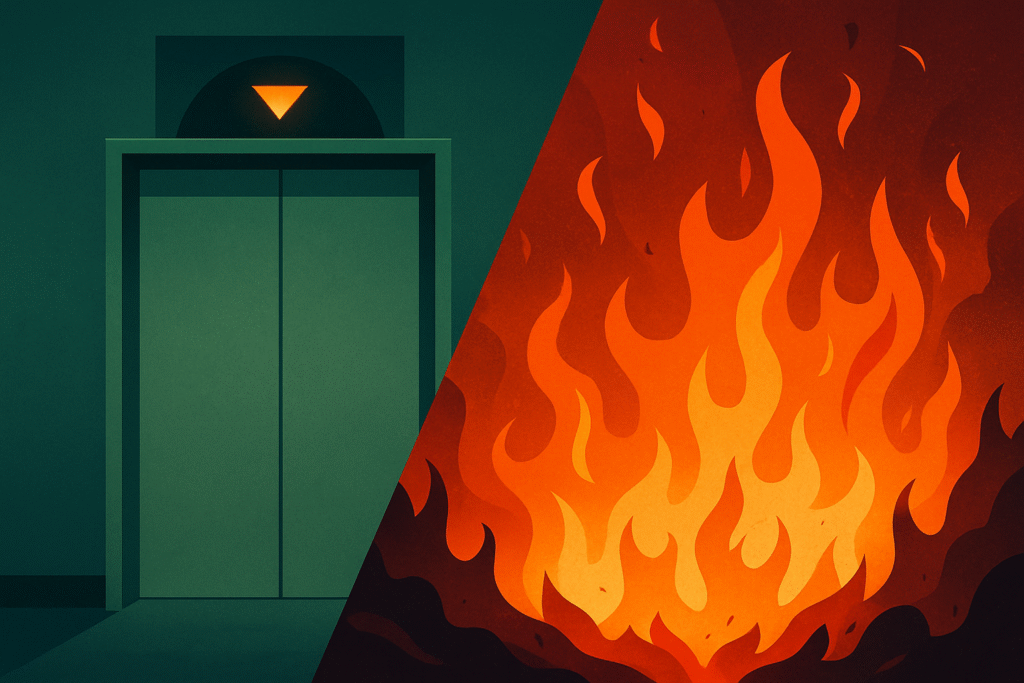How a dystopian workplace drama reveals the cracks in the Retributive Gospel and opens our eyes to the beauty of restoration.
What if the world of your daily work life was all you ever knew? No sunrises. No loved ones. No memories of laughter or purpose. Just endless tasks in fluorescent-lit halls where every punishment is a tool of control, and your pain serves someone else’s agenda.
If you’ve watched the Apple TV+ series Severance, you’ve seen this nightmarish concept brought to life. The show centers around employees of Lumen Industries who undergo a procedure that splits their consciousness in two: their “innie” self lives in the office, never able to leave or remember the outside world, while the “outie” self enjoys a normal life without knowledge of what goes on at work.
The result? A haunting commentary on identity, free will, and what it means to be human. But beyond the dystopia and corporate satire, Severance serves as an unexpected parable for the brokenness of the Retributive Gospel—a theology that centers God’s justice around punishment and eternal torment.
Let’s explore how Severance exposes the moral and emotional repugnance of eternal conscious torment (ECT), and how it actually points toward a deeper, restorative view of God’s justice.
🧠 1. The Illusion of Free Will
“They chose it.”
One of the most common justifications for hell is the idea that people freely choose it. But Severance turns that notion on its head. Yes, the Lumen employees technically “chose” to undergo the procedure. But did they really? Their “outies” signed the contract without full awareness of what their “innies” would endure. Once severed, the “innie” is trapped in an artificial world with no knowledge, no context, no ability to escape.
This highlights a crucial theological question: Can someone be said to “choose” hell if they are blinded, wounded, and uninformed?
Jesus’ words on the cross echo through this: “Father, forgive them, for they know not what they do.” But the Retributive Gospel claims, “They knew enough. Let them suffer forever.”
True free will requires informed consent, not coerced fear or inherited brokenness. The Restorative Gospel understands that God’s response to ignorance and pain is mercy, not abandonment.
🌌 2. Cut Off from Love, Beauty, and Life
The world of the “innies” is bleak. No sunshine. No family. No meaning. Even joy is fabricated—music dance experiences, waffle parties, corporate slogans masking psychological torment.
This mirrors what many claim hell to be: a realm devoid of God, love, beauty, and connection. But watching Severance, we feel how wrong this is. We know instinctively that such conditions are inhuman. That it’s evil to create a space where people are cut off from all that makes life worth living.
So why do we call it evil when humans do it, but justice when God does it?
The Retributive Gospel says: You chose separation. Live with it forever.
The Restorative Gospel says: God enters into our darkness to rescue us from it. There is no place His love cannot reach.
🔥 3. Punishment That Controls, Not Heals
Think about the infamous break room in Severance. A person is forced to repeat confessions over and over until some unseen metric of repentance is met. It isn’t about transformation—it’s about compliance. Shame. Submission.
Retributive justice operates the same way: punish the wrongdoer because they deserve it, not to help them change. But what loving parent disciplines this way?
Loving discipline is not about pain. It’s about restoration.
| Retributive Gospel | Restorative Gospel | |
|---|---|---|
| God’s goal | Punish sin | Heal wounds, restore wholeness |
| Free will | Binary choice under fear | Ongoing relationship and revelation |
| Justice | Suffering deserved forever | Making things right, healing what was broken |
| Separation | God cuts off the wicked | God chases them down like the lost sheep |
| Hell | Eternal conscious torment | Refined, purifying fire that restores |
| Jesus’ role | Substitute punished in our place | Embodiment of love, healer of humanity |
🛍️ 4. Loss of Self and True Identity
Severance isn’t just about punishment. It’s about fracturing identity. The “innie” becomes a ghost of a person, robbed of memory, robbed of context, robbed of their full humanity.
This is the same final fate many retributive frameworks assign to those in hell—permanently severed from their created purpose, frozen in rebellion, with no hope of healing or reunion.
But the gospel of Jesus is about making people whole. He doesn’t throw away fractured people. He restores them.
“God was in Christ, reconciling the world to Himself” (2 Corinthians 5:19).
📊 5. Other Parallels Worth Noticing
Here are a few other striking examples from Severance that can serve as theological reflection points:
- The Fake Celebration Rooms: These synthetic rewards (music dances, finger traps) highlight how systems of control create shallow imitations of joy. This critiques the idea that heaven can be a place of perfect happiness while others suffer eternally.
- Helly’s Ache for Truth: Even when deeply embedded in the system, characters long for something real. This echoes the truth that the image of God cannot be fully erased. Hope remains. Light shines in the darkness.
- Corporate God-Complex: Lumen’s authoritarian control mirrors how some versions of God resemble a cold, manipulative CEO more than a loving Father. If we recoil at Lumen, why do we worship its theological equivalent?
❤️ Jesus Is the Anti-Severance
Jesus came not to sever us, but to restore us.
Not to shame us into submission, but to love us into wholeness.
Not to abandon us in spiritual break rooms of eternal regret, but to lead us into healing, union, and peace.
The Retributive Gospel says: You made your bed. Lie in it. Forever.
The Restorative Gospel says: You are lost, and I will leave the 99 to bring you home.
Jesus does not create a break room. He breaks in to set the captives free.
Final Thought
The beauty of Severance is that it stirs our moral imagination. We feel the wrongness of fractured identity, synthetic joy, manipulative systems, and unjust punishment. And when we apply that same moral clarity to our theology, we begin to ask better questions.
Not: What does God have the right to do?
But: What does a loving God long to do?
Not: How do we get what we deserve?
But: How does love heal what was broken?
The answer is found in Jesus. Not a gatekeeper of punishment—but the healer of our souls.
If you found this reflection meaningful, share it with someone wrestling with questions about hell, justice, or the nature of God. Maybe, just maybe, they’ll discover that restoration was always the real story.

